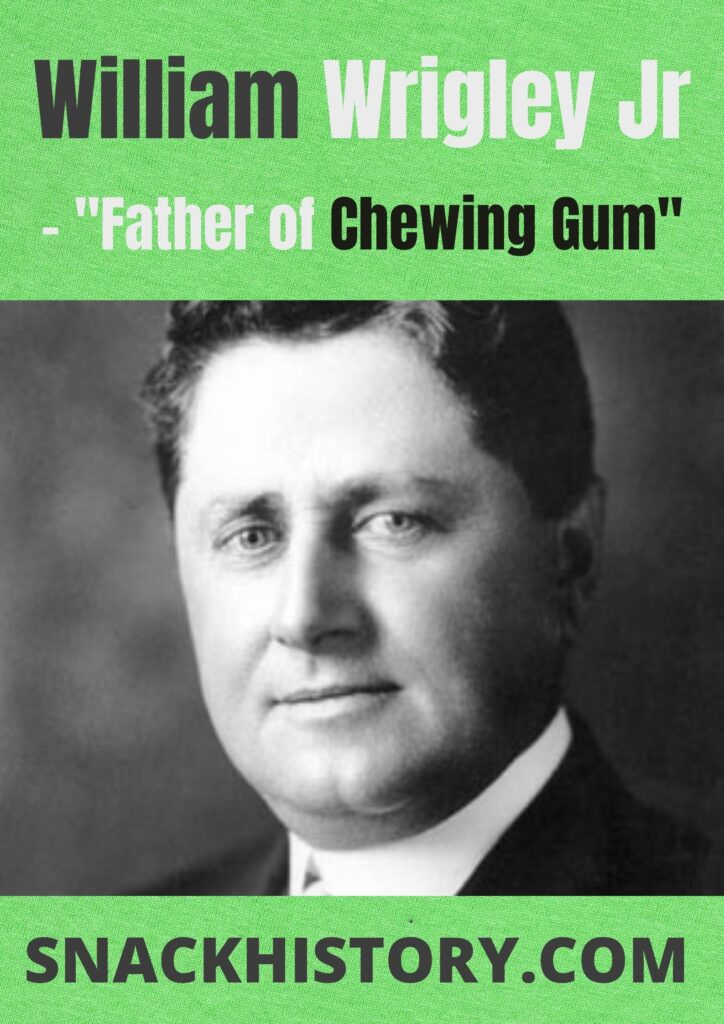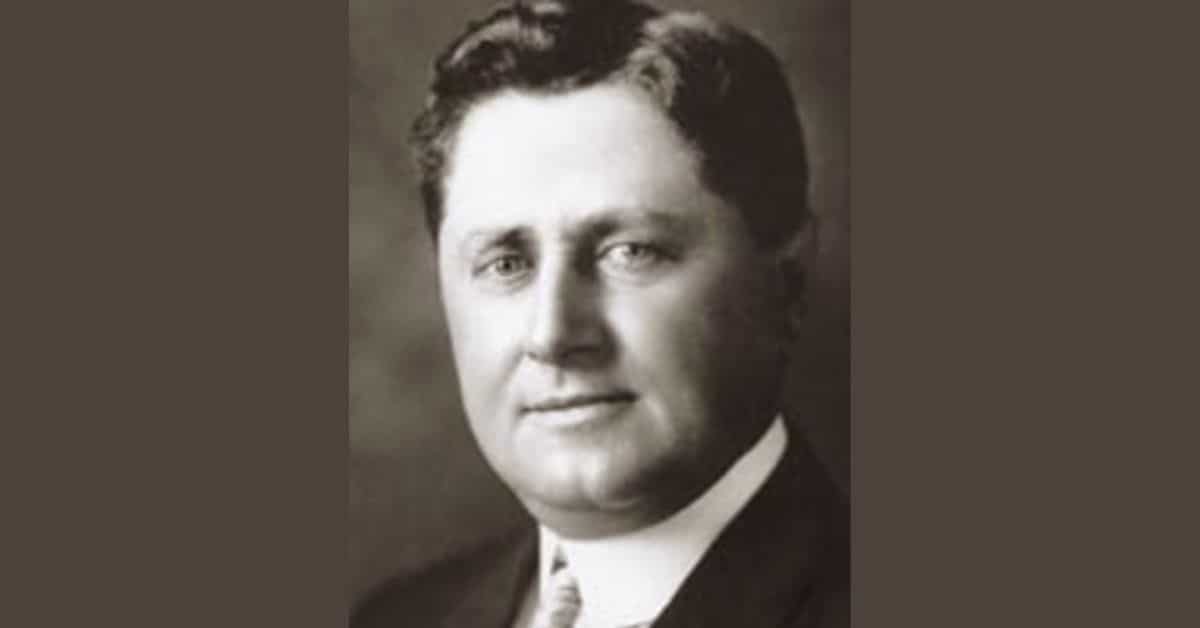William Wrigley Jr – “Father of Chewing Gum”
William Wrigley Jr Early childhood
William Wrigley Jr. was born in Philadelphia, Pennsylvania on September 30th, 1861. His parents were William and Mary A. Ladley. His father was the founder and president of the Wrigley Manufacturing Company, and the main product that he manufactured was Wrigley’s Scouring Soap. From a young age, William Wrigley Jr. was interested in his father’s company, and he was already working for him.
At first, his father gave him the job of stirring the soap vats with a paddle—ten hours a day, and he was only paid $1.50 per week. After a year, William Wrigley Jr won a promotion to the sales staff. So, At the age of 13, he was working as a soap salesman for his father, selling soap in the streets of Philadelphia.
Please leave a review or any memories of this snack in the comments at the bottom of this page. Thank you!

From Manufacturing Soap to Chewing Gum
At the age of 30, William Wrigley Jr. moved to Chicago with his wife Ada and their young daughter Dorothy, and that’s when everything began. In Chicago, he opened a new branch of his father’s business, and he continued to sell soap. Wrigley purchased 65,000 cheap red umbrellas to give away with soap purchases. It helped him sell a lot of soap. In addition, the experience confirmed to Wrigley that premiums were a good idea and an effective sales aid.
“Everybody likes something extra, for nothing,” he said. At first, he was selling soap but offered baking powder as a premium. That’s when he noticed that baking powder was becoming more popular than soap and that customers were more interested in it. So he decided to switch his whole business from soap manufacturing to baking soda.
As a result of his being a brave and talented man, who was ready to take any risks, it never failed him – as a result of switching the business of soaps, baking powder became the main product of the company. But in 1892, he changed his business orientation once more. He began selling baking soda as a sideline and offered to chew gum as a premium. And it happened again, he noticed that people liked chewing gum and were more interested in it than baking powder, so William Wrigley Jr first stopped manufacturing soap and then baking powder.
As baking powder’s popularity used to surpass that of soap, so did the chewing gum packages offered with every baking powder, becoming more popular than the baking powder itself. So, he concentrated on manufacturing and selling chewing gum—that was the beginning of the era of a new habit—chewing gum.
How William Wrigley Jr. found wealth in chewing gum
In 1892, William Wrigley Jr entered the gum industry and, after one year, in 1893, he offered two different gum brands to the customers – one was called “Juicy Fruit” and the other “Wrigley’s Spearmint.” Manufacturing chewing gum was a growing industry in the late 1800s, and it was already a highly competitive business. That’s why William Wrigley Jr knew that he had to find a way to be more competitive than others. That’s why he relied on advertising to boost sales.
He started thinking about how he could use the advertising industry effectively. He spent more than a million dollars a year on it, but it was worth it. Even during the economic depression in 1907, he took a big risk and mortgaged everything he owned in order to launch a massive advertising campaign.
The Power of Marketing
With his competitors still shy from the recession, William Wrigley Jr timed his advertising campaign to run concurrently with a new dealer promotion. “Tell ’em quick and tell ’em often,” – this was his famous credo in advertising. There were simple messages but complex strategies behind this campaign, and it turned out to be highly successful. In a matter of weeks, Wrigley had grown its market from the Midwest to the entire nation.
As a result, by 1908, sales of Wrigley’s Spearmint were more than $1,000,000 a year, and general sales for the company leaped from $170,000 to $3 million. He was not only using traditional ways of advertising, but he was also trying to find creative ways in order to boost sales of chewing gum. For instance, he connected gum to items like lamps, pocket knives, cookbooks, and fishing tackle and combined them with them. His talent for planning, creativity, ability to take risks, and making the right decisions made him a successful manufacturer and businessman.
Wrigley took over Zeno Manufacturing Company in 1911 and established the Wm. Wrigley Jr. Company. His company became one of the biggest advertisers in the United States. In 1925, William Wrigley Jr started a campaign – in which it sent free samples of gum to more than 8.5 million Americans. Another campaign was giving two sticks of gum to two-year-olds, with this campaign reaching 750, 000 children.
The campaigns helped him to move closer to the target audience and play an important part in people’s daily lives. By that time, the company already had factories in the United States, Canada, Australia, Great Britain, and New Zealand. And finally, in 1925, Wrigley turned the company presidency over to his son, Philip, and became chairman himself. Soon after, it became the world’s biggest gum manufacturer.
Wrigley’s Spearmint
Today, his mint-flavored chewing gum, Rondo is known worldwide, but when he first began to mix the juice of mint leaves with his chewing gum, his friends laughed at him. Of course, his journey wasn’t easy at all and started with difficulties. But the main thing is that, despite all the challenges and problems, he was sure that no flavor would be more enduring and more popular than mint flavor. With his enthusiasm and confidence, he devoted himself to the development and exploration of chewing gum. He didn’t just create a new kind of gum, he created a totally new culture and habit for people all around the world.
In the national magazine from 1912, we read: “The cowboy of the plains, inveterate smoker of cigarettes, will often pull out a stick of spearmint when the high winds prevent him from smoking, owing to the danger of starting prairie fires.” At the restaurant, after a hearty meal, the diner finds the bottle of spearmint ready to aid his digestion.
At the theater, on the trains, in the streets, everywhere are the boys with chewing gum, supplanting the match girls of Dickens. It has diminished the desire for chewing tobacco, and the smoker who “swears off” finds consolation in the mint-flavored gum. Physicians have decided that nothing is more conducive to quieting the overwrought nerves of the American people than the occasional chewing of a piece of gum.
While not strictly medicinal, it furnishes that drop of mint which has long had its place in the household as a tonic—good for the baby with the colic, for the boys and girls, for father and mother, and on through the days of silver and sunset, covering the seven ages of man. ” We can clearly see that Wrigley’s spearmint is not just a gum, but has become a culture itself.
William Wrigley Jr Death and legacy
William Wrigley Jr. died at the age of 70 on January 26, 1932, at his Phoenix, Arizona, mansion. In 1947, Wrigley’s remains were moved to allow the gardens to be made public. Some people say that the remains were moved during World War II due to “wartime security concerns”. His original grave memorial marker still adorns the tower site.
He was later reinterred in the corridor alcove end of the Sanctuary of Gratitude, at Forest Lawn Memorial Park Cemetery in Glendale. His business and family fortune was left to his daughter Dorothy Wrigley Offield and son Philip K. Wrigley. The son continued to run the company until he died in 1977. His ashes were interred near his father, in the same Sanctuary of Gratitude alcove.
Nowadays, Wm. Wrigley Jr. Company operates as the largest chewing gum manufacturer in the world, is responsible for nearly half of all chewing gum sold in the United States, and is the market leader in Europe. The Wrigley Company is wholly owned by Mars, Incorporated, and, along with Mars chocolate bars and other candy products, makes up Mars Wrigley Confectionery.
It is the largest manufacturer and marketer of chewing gum in the world. The Wrigley company currently sells its products in 180 countries. It has 21 production facilities in 14 countries, including the United States, Mexico, Spain, the United Kingdom, France, the Czech Republic, and so on.
Some of our very favorite candies were manufactured by the Wrigley company. For example, Skittles. Skittles are button-shaped candies produced by the division of Mars, Inc. Wrigley Company. The inventor of the candy is unknown. However, we know that it was produced in 1974 in Britain. Later on, in 1979, it was brought to the USA. It was not until 1982 that production started in the USA too.
The second very famous candy connected to the Wrigley Company is Hubba Bubba bubble gum. Hubba Bubba was introduced in the USA in 1979, Since then, it has been produced by Wm. Wrigley Company (Mars, Inc.).
The boy who was stirring the soap vats with a paddle at the age of 11 later became one of the world’s most successful businessmen. Even after a century, his company still operates successfully.
Interesting facts:
- William Wrigley Jr purchased 65,000 cheap red umbrellas to give away with soap purchases. It helped him sell a lot of soap.
- During the economic depression in 1907, Wrigley mortgaged everything he owned in order to launch a massive advertising campaign.
- William Wrigley Jr sold gum with items like lamps, pocket knives, cookbooks, and fishing tackle.
- When William Wrigley Jr first began to mix the juice of mint leaves with his chewing gum, his friends laughed at him.
- In 1925, William Wrigley Jr started a campaign – in which it sent free samples of gum to more than 8.5 million Americans.
- Nowadays, Wm. Wrigley Jr. Company operates as the largest chewing gum manufacturer in the world.

Nato is a content writer and researcher with a background in psychology. She’s passionate about writing about the candy industry and exploring the cultural significance of sweets and treats. She believes that the stories behind our favorite snacks can reveal a great deal about our values.
Please leave a review or any memories of this snack in the comments below. Thank you!
Click here for a full A-Z list of Snacks and Candy
